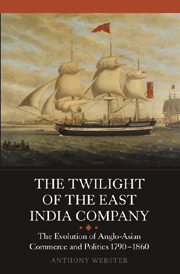 The Twilight of the East India Company
The Twilight of the East India Company Book contents
- Frontmatter
- Contents
- Preface
- 1 Introduction: The end of the East India Company, the historians and the evolution of Anglo-Indian commerce and politics
- 2 The origins of the East India Company and the rise of non-Company commercial interests in Britain, India and Asia, 1600–1793
- 3 War, politics and India: The battle for the East India Company trade monopoly, 1793–1813
- 4 Accommodating free trade: India, the East India Company and the commercial revolution of 1814–1830
- 5 Crisis and trade liberalisation 1830–1834: Financial chaos and the end of the East India Company's commercial role and privileges
- 6 Re-ordering Anglo-Asian commerce and politics: 1833–1847
- 7 Crisis, the resurgence of London and the end of the East India Company: 1847–1860
- 8 Conclusion: The decline of the East India Company and the evolution of British commercial and political interests in Asia, 1793–1860
- Notes
- Bibliography
- Index
Preface
Published online by Cambridge University Press: 12 September 2012
- Frontmatter
- Contents
- Preface
- 1 Introduction: The end of the East India Company, the historians and the evolution of Anglo-Indian commerce and politics
- 2 The origins of the East India Company and the rise of non-Company commercial interests in Britain, India and Asia, 1600–1793
- 3 War, politics and India: The battle for the East India Company trade monopoly, 1793–1813
- 4 Accommodating free trade: India, the East India Company and the commercial revolution of 1814–1830
- 5 Crisis and trade liberalisation 1830–1834: Financial chaos and the end of the East India Company's commercial role and privileges
- 6 Re-ordering Anglo-Asian commerce and politics: 1833–1847
- 7 Crisis, the resurgence of London and the end of the East India Company: 1847–1860
- 8 Conclusion: The decline of the East India Company and the evolution of British commercial and political interests in Asia, 1793–1860
- Notes
- Bibliography
- Index
Summary
The East India Company and British imperialism in India have rightly attracted the interest of generations of historians. Britain's acquisition of the ‘jewel in the crown’ of its empire was a lengthy and complex process, involving subtle diplomacy with Indian powers and European rivals, outright belligerence and strategies to make this costly and vast imperial possession pay its way. Especially intriguing is the fact that it was not the British state which embarked upon this long process of imperial conquest, but a company of merchants dedicated, initially at least, to commerce rather than military adventures. One consequence of this has been that the development of the East India Company itself has attracted as much interest as its role in the acquisition and governance of the Indian empire. The transformation of this organisation, from privileged trading company, to an agency for the running of Britain's most important colony, has been a source of much analysis, and even more controversy. For some, it was the forerunner of the great multinational companies, combining economic strength with political power, becoming a player on the international stage in its own right. For others, it evolved into a framework for other commercial interest groups to develop their activities, and a forum increasingly for debates about wider imperial policy.
This book examines the last seventy years of the East India Company's active life as the governing agent for the British Empire in India. The aim of the study is to explore how new commercial interest groups emerged from within the shadow of the Company to compete for political influence in the determination of imperial strategies in Asia. The commercial methods of these new organisations are explored, as are their relationships with each other and with the East India Company.
- Type
- Chapter
- Information
- The Twilight of the East India CompanyThe Evolution of Anglo-Asian Commerce and Politics, 1790–1860, pp. vii - viiiPublisher: Boydell & BrewerPrint publication year: 2009
